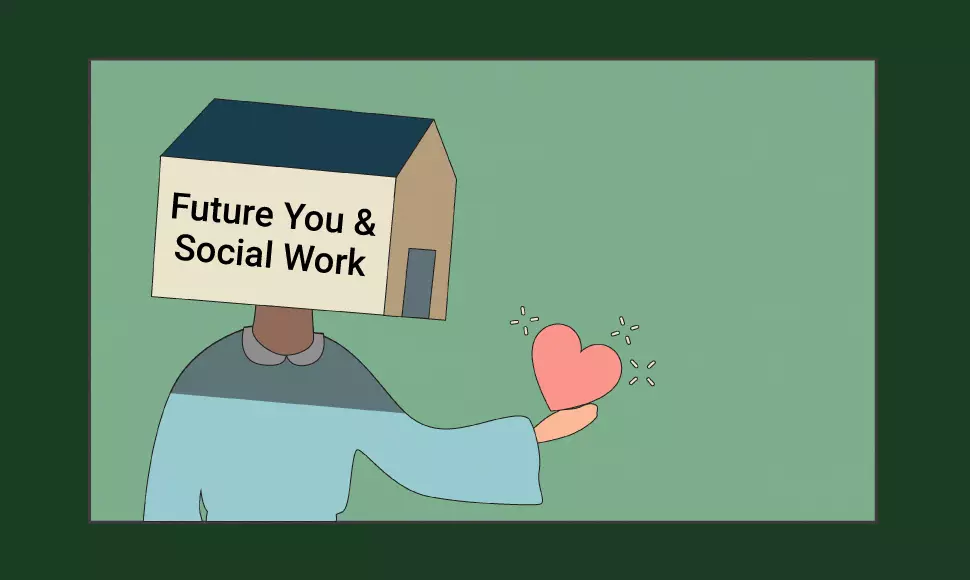Articles > Social Work > How to become a social worker
How to become a social worker

Written by Michael Feder

Reviewed by Christina Neider, EdD, Dean of the College of Social and Behavioral Sciences

What to know about how to become a social worker
Those looking into how to become a social worker should know that this role plays a crucial part in many developed societies, serving as the point of contact between social services and their intended beneficiaries. The social welfare of a community depends on individuals committed to identifying and supporting those in need. Whether someone needs help applying for food stamps for their family, getting into addiction recovery or anything in between, a social worker will likely be someone they can reach out to for help.
Social work encompasses a range of responsibilities that reflect the challenges faced in a society. Some areas of social work include:
- Mental health and substance abuse
- Healthcare
- Child welfare
- Aging
- Advocacy and community organization
- International social work
What do social workers do?
Before jumping into how to become a social worker, let's go over the duties of this position. Social workers largely perform their work in the form of casework, where each case represents an individual or family with a specific need. This individualistic focus takes a client’s particular environment and history into account.
According to the National Association of Social Workers (NASW), “Social work … recognizes the importance of family, community, culture, legal, social, spiritual and economic influences that impact the well-being of individuals, families, groups and communities.”
The objective of this ongoing work is to help a client remediate the immediate challenges to their welfare. Generally, the end goal is for the client to become self-sufficient and independent of continuous social work.
Of course, these are very general aspects of social work. Each client requires a specific approach, but some examples might be:
- A school social worker identifying signs of child abuse and advocating for the removal of that child from the abusive environment.
- A substance-abuse social worker following up with a client about their attendance in a support group.
- A healthcare social worker helping a patient adjust their homelife to a medical diagnosis.
As you can see, social work covers a wide variety of situations. If you have an interest in social work, it’s important to think about what your specific areas of interest are. Are you looking to work with young children or the elderly? Do you see yourself helping others out of abusive situations or with their own addictions? There are so many types of social work out there that there’s likely one that resonates with your interests and abilities.
What are my job prospects in social work?
As of May 2023, social workers earned between $38,400 and $94,910 , with a median of $58,380, according to the Bureau of Labor Statistics. Overall employment of social workers is projected to grow 7 percent from 2023 to 2033
, faster than the average for all occupations. About 63,700 opeinings for social workers are projected each year, on average, over the decade.
Salary ranges are not specific to students or graduates of University of Phoenix. Actual outcomes vary based on multiple factors, including prior work experience, geographic location and other factors specific to the individual. University of Phoenix does not guarantee employment, salary level or career advancement. BLS data is geographically based. Information for a specific state/city can be researched on the BLS website.
Here are a few of the careers a bachelor's degree in social work can educationally prepare you for:
- Caseworker
- Social services manager
- Child protection worker
- Family support specialist
- Family service worker
- Child welfare worker
- Foster care worker
Education for social workers
If you’re serious about learning how to become a social worker, education is a must. According to the Bureau of Labor Statistics, most entry-level positions in social work require at least a bachelor’s degree in social work. Additionally, the qualification to become a clinical social worker are different. Clinical social workers require a master's degree and two years of experience in a supervised clinical setting.
Social worker education requirements
While pursuing a social work degree, you should expect to take some general education courses and core courses, as well as field education courses. These field courses provide students the opportunity to earn practical knowledge and apply their skills in the field. Overall, programs are often designed to help prepare students to become licensed social workers in their states. Here are a few courses you should expect to need to become a social worker:
- Ethical behaviors
- Social welfare policy application and law
- Social justice and diversity
- Communication techniques
- Human behavior
- Research and evaluation
Qualifications for a social worker
These courses are meant to equip you with much of the technical knowhow that’s important in the social work field. Understanding the social, psychological and historical factors that inform modern social work can help you understand why this work is done in the way it’s done. With this background, you’ll be better equipped to respond effectively to every unique case.
A bachelor’s degree is meant to prepare you for work as a non-clinical social worker. There are two main types of non-clinical social work: direct and macro.
Direct social workers generally practice at the point of contact with a client. In a healthcare setting, for instance, a direct social worker would help connect a patient with recovery resources to leverage after they’re discharged.
Macro social workers focus on the big-picture challenges that face society today. You might find macro social workers in government agencies or nonprofits, advocating for policies to benefit communities.
How to become a licensed social worker
Obtaining a license to practice social work can be confusing. There are many levels of practice, and each state has different requirements. Many states offer a license or certification at the bachelor’s degree level for those who possess a degree from a Council on Social Work (CSWE) accredited school. After completing a master-level social work degree from a CSWE-accredited school, most states offer several options of licensure.
A person looking to become a clinician, must indicate clinical supervision hours and sit for an exam. Depending on the state, one may also acquire a license to practice at the macro level. This may or may not indicate additional supervision hours, but all will require an exam to receive the license. Always check with your states licensure board to get the most up-to-date information. Another resource is the Associate of Social Work Boards (ASWB).
A state licensure is required to become a clinical social worker. Unlike non-clinical social workers, these professionals can make diagnoses and provide psychological services to clients. Due to this increased responsibility, clinical social work generally requires a master’s degree in social work. In addition to education, all states require licensure for clinical social workers. Most states also require non-clinical social workers to be licensed.
How long does it take to become a social worker?
Generally, becoming a social worker can take anywhere between two to six years depending on specialty and education requirements for employment, length of the program and the time it takes to receive licensure.
Some programs may allow master’s students to earn their degree in a year, while the majority of master’s degrees can be earned in two to three years. From there, employment requirements will dictate if additional time is needed for internships, supervised clinical training or additional fieldwork experience.
How has technology changed the social work field?
The widespread use of digital services has changed nearly every field of work, and social work is no exception. Especially during periods like the COVID-19 pandemic, when social workers and their clients faced difficulties meeting face-to-face, technology proved crucial to many social services.
Many social workers perform their work over teleconference technology or video chat. This offers several benefits for clients, not the least of which is that it allows them to reach a social worker while remaining in a place where they feel safe. Clients can also now access their social workers at a moment’s notice, allowing for quick action when required.
The widespread implementation of case management software promises to streamline many of the more tedious tasks associated with social work. Instead of paper and filing cabinets, this software makes it possible for social workers to collect and process information easily. Everything from tracking client progress to managing a schedule can be automated with this technology, which frees up social workers to devote more of their time to interacting with clients.
By streamlining social work, new technology provides an experience to clients and social workers that is accessible and rewarding. It will likely have a profound effect on the future of social work.
Tips for success in social work
You've read about the main aspects of how to become a social worker, but as you've likely gathered, social work isn’t easy. It can require long hours, difficult client interactions and many emotional challenges. Social workers are often there for others in particularly bad situations, like child abuse or addiction. It’s not for the faint of heart, but for those who see their future in social work, these challenges are part of what makes such work rewarding.
If you feel called to social work, here are a few tips for success:
- Pursuing an education and licensure in social work will equip you with many of the technical skills necessary for a successful career in social work.
- Enhancing your communication skills will help you connect with your clients in a personal way and develop solutions around their individual personalities and histories.
- Joining one or more national social work organizations, such as the National Association of Social Workers, can help you find employment and secure benefits.
Social work can be a rewarding and fulfilling career choice, one where you can do some real good for members of your community. If you want to make a difference in people’s lives, social work is certainly a career to consider.
Discover more about how to become a social worker
University of Phoenix offers a Bachelor of Science in Social Work that can teach you about how to become a social worker. Check out other behavioral science programs as well.
Get to know Erick Lear , a Faculty of the Year winner in University of Phoenix’s social work degree program!

A certain type of person finds their way to social work. They want to help people. They have a lot of empathy and sympathy for others…for people who are struggling or who need a hand up, not a handout, but a hand up.
Samantha Dutton, PhD, LCSW, Lt Col (retired)
Associate Dean of Social Sciences, University of Phoenix

ABOUT THE AUTHOR
A graduate of Johns Hopkins University and its Writing Seminars program and winner of the Stephen A. Dixon Literary Prize, Michael Feder brings an eye for detail and a passion for research to every article he writes. His academic and professional background includes experience in marketing, content development, script writing and SEO. Today, he works as a multimedia specialist at University of Phoenix where he covers a variety of topics ranging from healthcare to IT.

ABOUT THE REVIEWER
Christina Neider is the dean of the University of Phoenix College of Social and Behavioral Sciences. Neider’s career spans more than 30 years in academia, healthcare and the U.S. Air Force. She has held several academic leadership roles at University of Phoenix, and she is the Vice President of membership for the Arizona Chapter of the Healthcare Information and Management Systems Society.
This article has been vetted by University of Phoenix's editorial advisory committee.
Read more about our editorial process.



